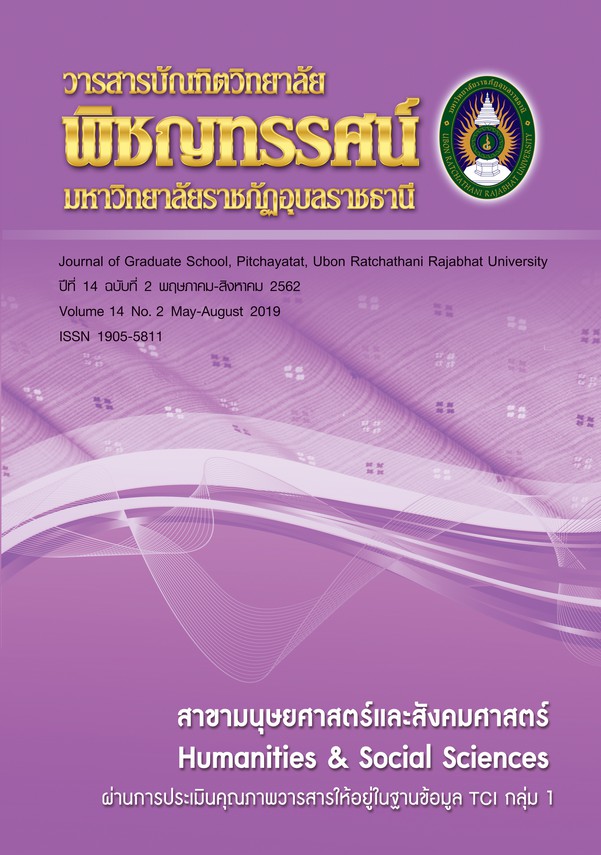การพัฒนาผลสัมฤทธิ์ทางการเรียน เรี่อง สมการ โดยใช้การเรียนแบบร่วมมือตามรูปแบบแข่งขันเป็นกลุ่มสำหรับนักเรียนชั้นมัธยมศึกษาปีที่ 2
บทคัดย่อ
การวิจัยครั้งนี้ มีวัตถุประสงค์เพื่อ 1) เปรียบเทียบผลสัมฤทธิ์ทางการเรียน นักเรียนชั้นมัธยมศึกษาปีที่ 2 ก่อนและหลังเรียน โดยใช้เทคนิคการเรียนแบบร่วมมือตามรูปแบบแข่งขันเป็นกลุ่ม เรื่อง สมการ และ 2) ศึกษาเจตคติต่อการเรียน โดยใช้การเรียนแบบร่วมมือตามรูปแบบแข่งขันเป็นกลุ่มเรื่อง สมการ ตัวอย่างคือ นักเรียนชั้นมัธยมศึกษาปีที่ 2 โรงเรียนมัธยมศึกษาตอนต้นดอนเขาะ อำเภอปากเซ จังหวัดจำปาสัก สาธารณรัฐประชาธิปไตยลาว ทั้งหมด 30 คน ซึ่งได้มาโดยการสุ่มอย่างง่าย โดยใช้ห้องเรียนเป็นหน่วยในการสุ่ม แบบแผนการวิจัยเป็นการวิจัยกึ่งทดลอง ระยะเวลาที่ใช้ในการทดลองคือ 12 ชั่วโมง เครื่องมือที่ใช้ในการวิจัย ได้แก่ 1) แผนการจัดการเรียนรู้การเรียนแบบร่วมมือตามรูปแบบแข่งขันเป็นกลุ่ม เรื่อง สมการ ชั้นมัธยมศึกษาปีที่ 2 จำนวน 12 แผน และ 2) แบบทดสอบวัดผลสัมฤทธิ์ทางการเรียนคณิตศาสตร์ เรื่อง สมการ ชั้นมัธยมศึกษาปีที่ 2 เป็นแบบทดสอบชนิด 4 ตัวเลือก จำนวน 30 ข้อ มีค่าความยากตั้งแต่ 0.33 ถึง 0.73 ค่าอำนาจจำแนกตั้งแต่ 0.33 ถึง 0.87 และค่าความเชื่อมั่น เท่ากับ 0.72 และ 3) แบบวัดเจตคติต่อการเรียนคณิตศาสตร์ซึ่ สถิติที่ใช้ ได้แก่ ค่าเฉลี่ย ส่วนเบี่ยงเบนมาตรฐาน และการทดสอบทีแบบกลุ่มสัมพันธ์ ผลการวิจัย พบว่า 1. ผลการพัฒนาผลสัมฤทธิ์ทางการเรียนเรื่อง สมการ โดยใช้การเรียนแบบร่วมมือตามรูปแบบแข่งขันเป็นกลุ่มสำหรับนักเรียนชั้นมัธยมศึกษาปีที่ 2 โรงเรียนมัธยมศึกษาตอนต้นดอนเขาะ อำเภอปากเซ จังหวัดจำปาสัก สาธารณรัฐประชาธิปไตยประชาชนลาวหลังเรียนสูงกว่าก่อนการเรียนอย่างมีนัยสำคัญทางสถิติที่ระดับ .05 2. ผลของแบบสอบถามเจตคติต่อการเรียน โดยใช้การเรียนแบบร่วมมือตามรูปแบบแข่งขันเป็นกลุ่ม เรื่อง สมการ พบว่าเจตคติของกลุ่มตัวอย่างโดยเฉลี่ยอยู่ในระดับมาก ( = 3.91, S = 0.72)
เอกสารอ้างอิง
พนิดา บัวมณี. การพัฒนาบทเรียนคอมพิวเตอร์ช่วยสอน กลุ่มสาระการเรียนรู้คณิตศาสตร์ เรื่องอัตราส่วนและร้อยละ สำหรับนักเรียนช่วงชั้นที่ 3 ชั้นมัธยมศึกษาปีที่ 2 . สารนิพนธ์ปริญญามหาบัณฑิต มหาวิทยาลัยศิลปากร, 2549.
วิมลรัตน์ สุนทรโรจน์. การจัดการเรียนรู้แบบกลุ่มร่วมมือแบบแข่งขันเป็นกลุ่ม. มหาสารคาม: คณะศึกษาศาสตร์ มหาวิทยาลัยมหาสารคาม, 2549.
ศึกษาธิการ,กระทรวง. หลักสูตรการศึกษาขั้นพื้นฐาน พุทธศักราช 2544. กรุงเทพฯ: โรงพิมพ์วัฒนาพานิช, 2545
ศรไกร รุ่งรอด. การศึกษาผลสัมฤทธิ์ทางการเรียนวิชาคณิตศาสตร์ และการให้การร่วมมือต่อกลุ่มของนักเรียนชั้นมัธยมศึกษาปีที่ 3 ที่ได้รับการสอนโดยใช้กิจกรรมการเรียนแบบ STAD กับกิจกรรมการสอนตามคู่มือครู สสวท. วิทยานิพนธ์การศึกษามหาบัณฑิต มหาวิทยาลัยศรีนครินทร์, 2533.
ศรีสุดา ญาติปลื้ม. การพัฒนาแผนการเรียนรูปแบบ TAI วิชาคณิตศาสตร์ เรื่อง อัตราส่วน และร้อยละ ชั้นมัธยมศึกษาปีที่ 2. การศึกษาค้นคว้าอิสระ การศึกษามหาบัณฑิต มหาวิทยาลัยมหาสารคาม, 2547.
สุรศักดิ์ หลาบมาลา. การเรียนการสอนแบบร่วมมือ, วิทยาจารย์. 6, 75 (2531): 4.
สมปอง พรหมพื้น. การพัฒนาความสามารถทางการเรียนการแก้โจทย์ปัญหาคณิตศาสตร์ โดยเน้นประสบการณ์ภาษาและร่วมมือกันเรียนรู้ของนักเรียนชั้นประถมศึกษาปีที่ 6. วิทยานิพนธ์ศึกษาศาสตรมหาบัณฑิต มหาวิทยาลัยศิลปากร, 2543.
สาคร บุญดาว. หน่วยที่ 13 การสอนคณิตศาสตร์เพื่อสนองความแตกต่างระหว่างบุคคล ใน ประมวลสาระชุดวิชาสารัตถุและวิทยวิธีทางวิชาคณิตศาสตร์. สาขาวิชาศึกษาศาสตร์: มหาวิทยาลัยสุโขทัยธรรมาธิราช, 2537.
อรุณศรี เหลืองธานี. การพัฒนาความสามารถในการแก้โจทย์ปัญหาคณิตศาสตร์ การเรียน แบบร่วมมือของนักเรียนชั้นประถมศึกษาปีที่ 6. วิทยานิพนธ์ศึกษาศาสตรมหาบัณฑิต มหาวิทยาลัยเกษตรศาสตร์, 2542.
Slavin, Robert E. Cooperative Learning. New York: longman, 1995.
ดาวน์โหลด
เผยแพร่แล้ว
รูปแบบการอ้างอิง
ฉบับ
ประเภทบทความ
สัญญาอนุญาต
บทความทุกเรื่องได้รับการตรวจความถูกต้องทางวิชาการโดยผู้ทรงคุณวุฒิภายนอกอย่างน้อย 3 คน ความคิดเห็นในวารสารพิชญทรรศน์เป็นความคิดเห็นของผู้นิพนธ์มิใช่ความคิดเห็นของผู้จัดทำ จึงมิใช่ความรับผิดชอบของวารสารพิชญทรรศน์ และบทความในวารสารพิชญทรรศน์สงวนสิทธิ์ตามกฎหมายไทย การจะนำไปเผยแพร่ต้องได้รับอนุญาตเป็นลายลักษณ์อักษรจากกองบรรณาธิการ





